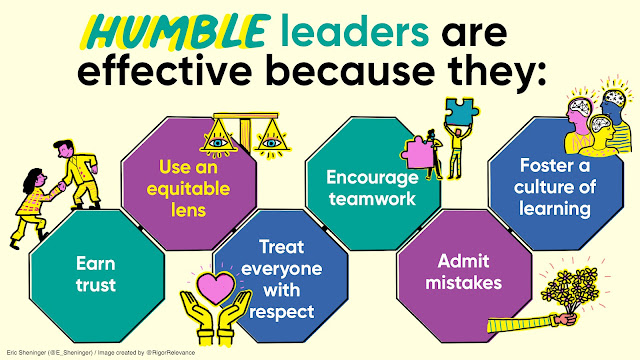Suppose you were to research or Google the qualities of effective leaders. In that case, all you would come up with are the typical characteristics such as good communication, ability to make difficult decisions, having a vision, models, and listening intently, to name a few. What doesn’t show up in routine searches is humility. There is a strong link between this trait and effective leadership. Jeff Hyman shared the following in a Forbes article:
A number of research studies have concluded that humble leaders listen more effectively, inspire great teamwork and focus everyone (including themselves) on organizational goals better than leaders who don’t score high on humility. Case in point: A survey of 105 computer software and hardware firms published in the Journal of Management revealed that humility in CEOs led to higher-performing leadership teams, increased collaboration and cooperation and flexibility in developing strategies.
Humble leaders are able to get the most out of people through intrinsic means, which often leads to lasting change and a positive culture. Here is another bit from the Forbes piece referenced above:
Humble leaders understand that they are not the smartest person in every room. Nor do they need to be. They encourage people to speak up, respect differences of opinion and champion the best ideas, regardless of whether they originate from a top executive or a production-line employee. When a leader works to harness input from everyone, it carries through the organization. As other executives and line managers emulate the leader’s approach, a culture of getting the best from every team and every individual takes root.
So how does one become a humble leader? The first step is understanding who you are and how your actions might be perceived or impact others, something I dive into deeply in Digital Leadership. Humility is characterized by a low focus on the self and an honest assessment of one’s worth and accomplishments. It also requires an acknowledgment of one’s imperfections, limitations, mistakes, shortcomings, and other areas of growth. You basically need to understand who you are.
Humble leaders are highly effective because they:
- Earn trust
- Use an equitable lens
- Treat everyone with respect
- Encourage teamwork
- Admit mistakes
- Foster a culture of learning
Although this is a common misconception, being humble does not mean you are weak. While some might see humility as a weakness, it is possibly the most significant asset a leader can yield. You don’t need to have all the answers. Instead, you must know where to find them, or better yet, leverage your people as a means to build capacity. Humility means you trust the people who you work with, delegate when necessary, and provide feedback to spur growth. Sometimes you might need to evolve into a humble leader and daily reflection is critical using a window and mirror approach. In the words of C.S. Lewis, “Humility is not thinking less of yourself, it’s thinking of yourself less.”


